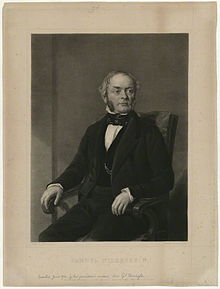Samuel Wilderspin
Samuel Wilderspin (23 March 1791, London – 1866) was an English educator known for his pioneering work on infant schools. His belief was that a child should be encouraged to learn through experience, and to development in feelings as well as intellect. His work provided the model for infant schools in Europe and North America.

Life
Wilderspin was apprenticed as a clerk in the City of London, but later trained in infant education. Through a New Jerusalem Church in south London, he met James Buchanan, an Owenite who had recently set up an infant school at Brewer's Green in Westminster. With his wife Sarah Anne, Wilderspin ran an infant school in Spitalfields, London, from 1820.[1] This school particularly impressed David Stow, who invited Wilderspin to Glasgow to lecture on it.[2]
Wilderspin published On the Importance of Educating the Infant Poor in 1823, based on his experiences in Spitalfields. He began working for the Infant School Society the next year, informing others about his views on education. It folded in 1828, but Wilderspin continued to propagate his views nationally.[1]
Views
The ideas current at this time on infant education went back to J. F. Oberlin and Robert Owen.[3] Wilderspin's approach to schooling as necessary for a socially and morally prepared child was informed by his Swedenborgianism.
Play was an important part of Wilderspin's system of education, and he is credited with the invention of the playground. He also ran a company supplying apparatus for playground activities.
Works
Wilderspin wrote:[3]
- On the Importance of educating the Infant Poor, 2nd ed. London, 1824; a third edition appeared in 1825 as Infant Education.
- Early Discipline illustrated, London, 1832; 3rd ed. 1840.
- A System of Education for the Young, London, 1840.
- A Manual for the Instruction of Young Children (with Thomas John Terrington), London and Hull, 1845.
- The Infant System for Developing, &c. (in this he calls himself "inventor of the system of infant training"), 8th ed. London, 1852.
Samuel Wilderspin wrote "The Infant System,for developing the physical, intellectual, and moral powers off all children from 1 to seven years of age".
Legacy
Several hundred schools were founded by Wilderspin throughout the United Kingdom. However, Queen Street School in Barton-upon-Humber is the only known surviving school built to his designs. It was completed in 1845, and Wilderspin himself taught at the school for several years before retiring in 1848.
His papers are in Senate House Library, University of London.
References
This article includes a list of general references, but it lacks sufficient corresponding inline citations. (October 2008) |
- Queen Street School Heritage Project at the Wayback Machine (archived August 11, 2007) - restoration project for one of Wilderspin's schools.
- AIM25 Archives - Short biographical sketch of Samuel Wilderspin.
Notes
- ^ a b McCann, W. P. "Wilderspin, Samuel". Oxford Dictionary of National Biography (online ed.). Oxford University Press. doi:10.1093/ref:odnb/29404. (Subscription or UK public library membership required.)
- ^ Lee, Sidney, ed. (1898). . Dictionary of National Biography. Vol. 55. London: Smith, Elder & Co.
- ^ a b Lee, Sidney, ed. (1900). . Dictionary of National Biography. Vol. 61. London: Smith, Elder & Co.
- Attribution
![]() This article incorporates text from a publication now in the public domain: Lee, Sidney, ed. (1900). "Wilderspin, Samuel". Dictionary of National Biography. Vol. 61. London: Smith, Elder & Co.
This article incorporates text from a publication now in the public domain: Lee, Sidney, ed. (1900). "Wilderspin, Samuel". Dictionary of National Biography. Vol. 61. London: Smith, Elder & Co.
External links
- Papers of Samuel Wilderspin in Senate House Library, University of London
- Additional Papers of Samuel Wilderspin in Senate House Library, University of London
- Wilderspin National School - museum in Barton on Humber, England
- Works by Samuel Wilderspin at Project Gutenberg
- Works by or about Samuel Wilderspin at the Internet Archive
- The Infant System at Project Gutenberg
